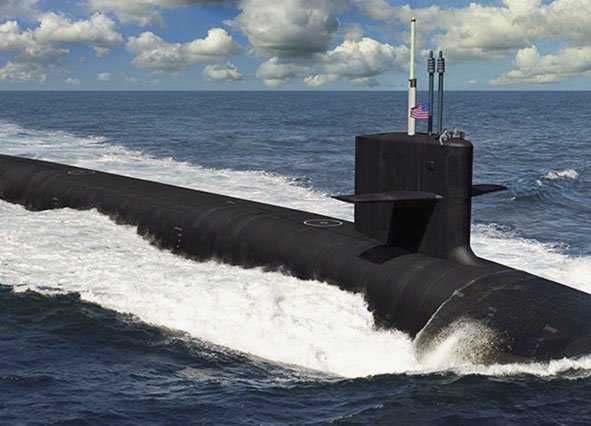- About
- Intara
- Capabilities
- Advisory
- Resources
- News
- Store
Covid-19: Virus restrictions spark concerns over Columbia schedule
28 May 2020
Shipbuilding workforce changes meant to slow or prevent the spread of Covid-19 in shipyards have raised questions about the potential effect of any yard slowdowns on meeting the tight US Navy (USN) schedule for building and deploying the service’s first Columbia-class ballistic missile submarine (SSBN).
“Operations at the submarine shipyards and/or supplier firms could be affected by the Covid-19 situation if workers remain home rather than report to work because they are either positive for the virus, are remaining home as part of an effort to maintain social distancing, are taking care of children who have been sent home from school for the same reason, or are taking care of family members who have become ill as a result of the virus,” the Congressional Research Service (CRS) noted in its 14 May report update on the Columbia-programme.
Shortly after the release of the CRS report, James Geurts, the assistant navy secretary for Research, Development and Acquisition, underscored the USN’s efforts to keep the Columbia acquisition on track.

Early contract negotiations for Columbia-class submarines could blunt Covid-19 knock-on effects on programme schedules.
OCCAR and MBDA sign HYDIS² concept phase contract
17 May 2024
by Nicholas Fiorenza


OCCAR and MBDA have launched the HYDIS² concept phase. (MBDA)
The Organisation for Joint Armament Cooperation (OCCAR) and MBDA announced on 15 May that they signed a European Defence Fund (EDF) grant agreement and a linked procurement contract to launch the three-year HYpersonic Defence Interceptor Study (HYDIS²) concept phase on the same day. MBDA signed the agreements on behalf of the 19 industrial partners in HYDIS². In its press release, OCCAR valued the programme at EUR140 million (USD152 million), EUR80 million of which is co-funded by the EDF.
The concept phase aims to mature critical technologies focusing on the operational requirements of participating countries France, Germany, Italy, and the Netherlands, which will support the selection of a concept afterwards and will contribute to MBDA's Aquila counter-hypersonic interceptor concept. Another aim of the concept phase is to create an industrial network to develop future counter-hypersonic missile systems.
An MBDA spokesperson told Janes
Indonesia receives final C-130J-30
17 May 2024
by Akhil Kadidal


Indonesia was supposed to receive its fourth and fifth (and final) C-130J-30s in January 2024. In this January 2024 picture is the first C-130J-30 received by Indonesia (serial no A-1339), which arrived in Indonesia on 6 March 2023. (Eko Siswono Toyudho/Anadolu via Getty Images)
The Indonesian Air Force (TNI-AU) has announced that it has received its fifth and final Lockheed Martin C-130J-30 Super Hercules.
“The fifth C-130J-30 (with tail number A-1342) has arrived at Halim Perdanakusuma Air Base in Jakarta,” the Indonesian Ministry of Defense (MoD) announced on 16 May. Janes has previously reported that the acquisition of the five aircraft was part of a Direct Commercial Sale (DCS) contract with Lockheed Martin.
According to the original delivery schedule, four C-130J-30s were to be delivered by October 2023, with the final aircraft to be delivered in January 2024. According to the MoD, three C-130J-30s were delivered in 2023: the first in March 2023 (serial no A-1339), the second aircraft in June 2023 (A-1340), and the third in August 2023 (A-1343). A fourth aircraft (A-1344) was delivered in January 2024.
Poland completes receipt of Turkish UAVs
17 May 2024
by Gareth Jennings


Poland now has all 24 of the TB2 UAVs it ordered from Türkiye, operating them across four systems based at the 12th Unmanned Aerial Vehicle Base at Mirosławiec. (Polish MND)
Poland has received the last of 24 Baykar Bayraktar TB2 armed unmanned aerial vehicles (UAVs) from Türkiye.
The Polish Armaments Agency (AA) announced the milestone on 16 May, saying that the last four unmanned aircraft systems (UASs), each comprising six UAVs, had been received into the 12th Unmanned Aerial Vehicle Base at Mirosławiec on the same day.
“The Secretary of State in the Ministry of National Defense, Paweł Bejda, together with representatives of the Polish Armed Forces, took part in the ceremony of completing the delivery of the last, fourth set of the Bayraktar TB2 unmanned reconnaissance and strike system,” the AA said.
Shipbuilding workforce changes meant to slow or prevent the spread of Covid-19 in shipyards have rai...
Latest Podcasts
The value of OSINT for intelligence sharing
In this episode Harry Kemsley and Sean Corbett are joined by Phil Ritcheson Ph.D. to discuss why intelligence sharing is now more important than ever. They discuss the growing need for allied and partnership and how by using open sources facilit...
Listen nowJanes Case Studies
Using Janes Intara to build a common intelligence picture: Russian build up on the Ukrainian border
View Case StudyNews Categories
 Security Details
Security Details